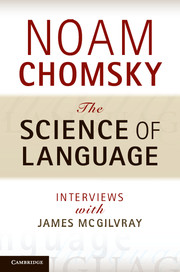Book contents
- Frontmatter
- Contents
- Introduction
- Part I The science of language and mind
- Part II Human nature and its study
- 15 Chomsky on human nature and human understanding
- 16 Human nature and evolution: thoughts on sociobiology and evolutionary psychology
- 17 Human nature again
- 18 Morality and universalization
- 19 Optimism and grounds for it
- 20 Language, agency, common sense, and science
- 21 Philosophers and their roles
- 22 Biophysical limitations on understanding
- 23 Epistemology and biological limits
- 24 Studies of mind and behavior and their limitations
- 25 Linguistics and politics
- Appendices
- Commentaries
- Glossary
- Bibliography
- Index
15 - Chomsky on human nature and human understanding
from Part II - Human nature and its study
Published online by Cambridge University Press: 05 June 2012
- Frontmatter
- Contents
- Introduction
- Part I The science of language and mind
- Part II Human nature and its study
- 15 Chomsky on human nature and human understanding
- 16 Human nature and evolution: thoughts on sociobiology and evolutionary psychology
- 17 Human nature again
- 18 Morality and universalization
- 19 Optimism and grounds for it
- 20 Language, agency, common sense, and science
- 21 Philosophers and their roles
- 22 Biophysical limitations on understanding
- 23 Epistemology and biological limits
- 24 Studies of mind and behavior and their limitations
- 25 Linguistics and politics
- Appendices
- Commentaries
- Glossary
- Bibliography
- Index
Summary
JM: Now we switch to human nature . . .
NC: OK.
JM: Human beings as a species are remarkably uniform, genetically speaking. Yet humans have proven extraordinarily adaptable in various environments, extremely flexible in their ability to solve practical problems, endlessly productive in their linguistic output, and unique in their capacity for inventing scientific explanations. Some, a great many in fact, have taken all this as reason to think that human nature is plastic, perhaps molded by environment – including social environment – and individual invention. The engines of this flexibility and invention are claimed to lie in some recognition of similarities, in induction, or in some other unspecified but general learning and invention technique. This plastic view of human nature has even been thought to be a progressive, socially responsible one. Clearly you disagree. Could you explain why you think that a fixed biologically determined and uniform human nature is compatible with and perhaps even underlies such flexibility, productivity, adaptability, and conceptual inventiveness?
NC: First of all, there's a factual question – does a fixed biological capacity underlie these human capacities? I don't know of any alternative. If somebody can tell me what a general learning mechanism is, we can discuss the question. But if you can't tell me what it is, then there's nothing to discuss. So let's wait for a proposal. Hilary Putnam, for example, has argued for years that you can account for cognitive growth, language growth and so on, by general learning mechanisms. Fine, let's see one.
Actually, there is some work on this which is not uninteresting. Charles Yang's (2004) work in which he tries to combine a rather sensible and sophisticated general learning mechanism with the principles of Universal Grammar, meaning either the first or the third factor – we don't really know, but something other than experience – and tries to show how by integrating those two concepts you can account for some interesting aspects of language growth and development. I think that's perfectly sensible.
- Type
- Chapter
- Information
- The Science of LanguageInterviews with James McGilvray, pp. 95 - 102Publisher: Cambridge University PressPrint publication year: 2012

